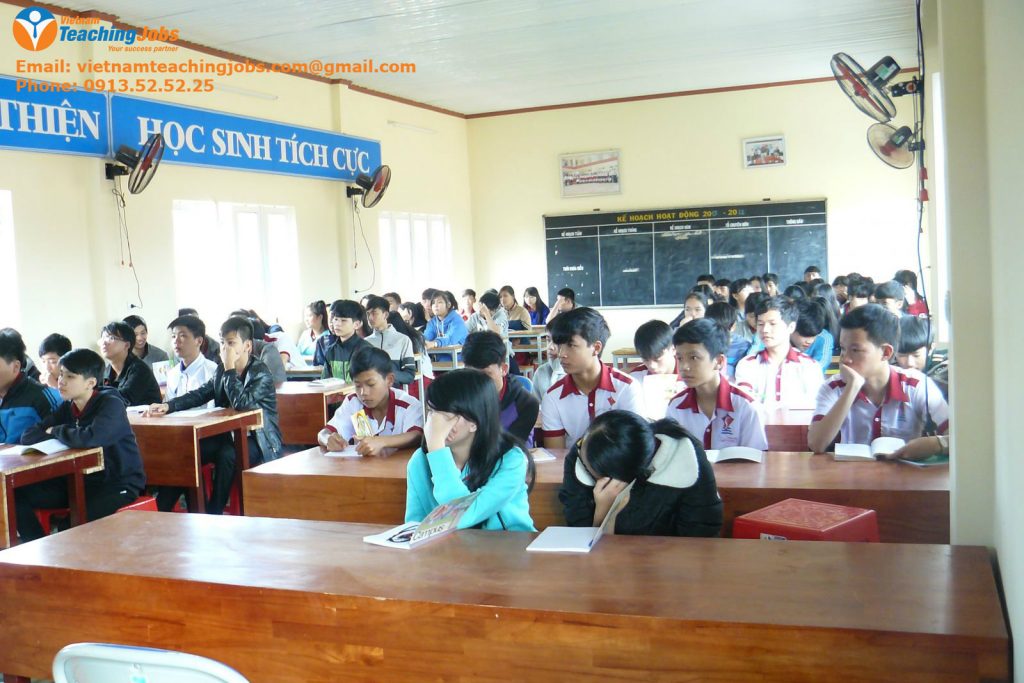English education in Vietnam has to change and the change must start from the quality of English teacher in Vietnam. Here are three reasons for this change.
I. Vietnam’s English training system
 English education in Vietnam relies heavily on learning grammar, writing and not focus on speaking and communicating in English. Vietnamese schools and universities often teach their students about advance grammar and vocabulary that rarely being used in real life rather. On the other hand, Vietnamese education in English often neglects the practice of speaking and communicating in English.
English education in Vietnam relies heavily on learning grammar, writing and not focus on speaking and communicating in English. Vietnamese schools and universities often teach their students about advance grammar and vocabulary that rarely being used in real life rather. On the other hand, Vietnamese education in English often neglects the practice of speaking and communicating in English.
Before this fact, changes are inevitable. Because if the education system does not change, the market will do it on its own. Students are wasting a lot of time learning English at school, but cannot use it in real life. Meanwhile, a large number of employees have to go out to re-learn English to adapt to the market’s requirements. This is a huge waste of resources of society and needs to be changed.
II. Too many students in one class:
 Another challenge for the English teacher in Vietnam is that there are too many students in one class. With the current large number of students, teaching focused on pronunciation and communication (practical) instead of grammar will pose a big challenge for the whole system.
Another challenge for the English teacher in Vietnam is that there are too many students in one class. With the current large number of students, teaching focused on pronunciation and communication (practical) instead of grammar will pose a big challenge for the whole system.
Firstly, the evaluation of Students through the ability to pronounce/communicate is much more difficult when the classroom is too large. Furthermore, with the thin resources of qualified teachers to assess the pronunciation/communication ability of the students makes the problem even more difficult.
Secondly, teachers will have a harder time to manage the classroom if the number of students is too big. In teaching English, the teachers should pay attention to each and every student in order to really help them in becoming a good English speaker. However, this seems impossible if the number of students in one classroom is forty!
III. The quality of English teachers in Vietnam
 English teachers in Vietnam are lacking in both quality and quantity. This makes program innovation much more difficult for Vietnamese training system. Even if the educational program changes in the direction of pronunciation training instead of grammar, the small part of teachers is not qualified and bravery to accurately assess students.
English teachers in Vietnam are lacking in both quality and quantity. This makes program innovation much more difficult for Vietnamese training system. Even if the educational program changes in the direction of pronunciation training instead of grammar, the small part of teachers is not qualified and bravery to accurately assess students.
Even in reputable schools with students of 8.0 IELTS or 100 TOEFL iBT, the quality of English teachers is a big question mark. If standardizing the quality of teachers through TOEFL iBT or IELTS scores, I am confident that a large number of university teachers have low, even very low scores. Of course, a large percentage of teachers will also have high and very high scores.
In conclusion, English education in Vietnam must change. The first change, though, must start from the English teacher in Vietnam itself. If they pronounce correctly, communicate well, they will train students and students to pronounce well and communicate. To do this, it is necessary to be more rigorous about the standard of English teachers (at least equivalent to 90 TOEFL iBT or 7.0 IELTS), along with the necessary roadmap and support from the school and the Ministry of Education.
Are you facing difficulties in finding and securing teaching positions in Vietnam? Are visa procedures causing you trouble? Feeling overwhelmed and directionless upon your arrival in Vietnam for teaching assignments? Don’t worry, VTJ’s English Teaching Placement in Vietnam (EPIV) Program 2024 provides comprehensive support to solve ALL the matters.
👉👉👉 Click HERE to request free consultation



